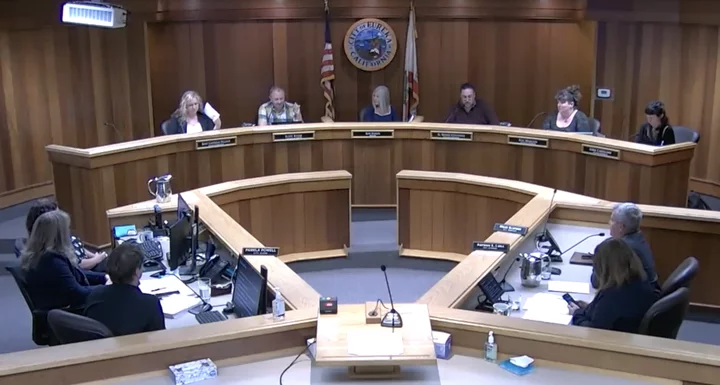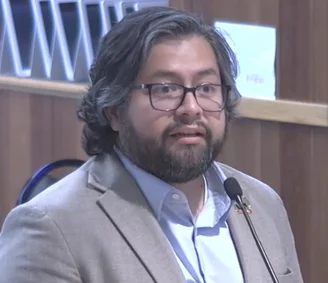Screenshot of Tuesday’s Eureka Council meeting.
###
At the next municipal election on Nov. 5, Eureka voters will be asked whether or not they want to approve the “Housing for All and Downtown Vitality” initiative, a controversial ballot measure that seeks to stop housing development on city-owned downtown parking lots. How exactly that question will be phrased is still up in the air.
At this week’s regular meeting, the Eureka City Council reviewed the proposed text of the ballot question, which is limited to 75 words, and tried to come up with language that would more accurately convey the intent of the initiative while maintaining neutrality.
Eureka City Attorney Autumn Luna informed the council that Brad Johnson, an attorney representing the proponents of the ballot measure, known as the Citizens for a Better Eureka, had asked the city to change the wording of the ballot question after the council’s agenda was published. (The original wording can be found here, under Section 2.) In the spirit of compromise, Luna said staff granted the request and crafted the following question:
Shall the measure amending Eureka’s General Plan, creating an overlay designation for downtown City lots that limits those lots, with exceptions, to parking and high-density housing, and creating an overlay for the former Jacobs Middle School site, allowing housing, public, quasi-public, and commercial uses, with at least 40% of non-public use area dedicated to high-density housing, subject to review for consistency with state law, by the California Department of Housing and Community Development, be adopted?
Councilmember Leslie Castellano noted that she is “very familiar” with the “Housing for All” initiative, but said she found the ballot question “a little confusing.”
“For instance, it slightly misconstrues the nature of the ballot initiative in terms of limiting the lots with exceptions to parking and high-density housing,” she said. “I mean, it mandates parking if high-density housing is built, which is different than limiting it with exceptions to parking and high-density housing. I just feel like that’s actually an important distinction.”
Luna emphasized how difficult it is to incorporate every aspect of a 19-page ballot initiative into a 75-word question, noting that the question is meant to capture the “spirit of the initiative.”
“We’ve done lots of workshopping internally, and we’ve also taken comment externally from the proponents’ attorney,” she said. “It is such a long initiative, it is very complicated to incorporate all of the different pieces, and that can never be done in 75 words. … If you were to ask 10 different people about what the question should be, you would get 1,000 different answers.”
Castellano expressed concern that the proposed question was “neutral to the point of misinforming the public,” reiterating that the question doesn’t address the requirement for parking if high-density housing is built.
“I hear you, but I think that it really would matter whether you were asking a proponent of the initiative or an opponent of the initiative what the point of the initiative is,” Luna said. “And so therein lies the complexity for us as a city to put a ballot question in front of the voters that doesn’t insert our feeling about it. … We’ve really tried to do the best we can with 75 words, and keeping in mind that neutrality is really important here.”
Councilmember Kati Moulton echoed Castellano’s concerns, adding that the question should clearly state the parking requirement, which is the “crux” of the initiative.
“It doesn’t say [what] makes this kind of a big deal to development,” Moulton said. “That point, I think, is one, why people like it, and two, why people don’t like it. People want that same number of parking spaces to be downtown no matter what gets built there, or people don’t want development that’s required to have expensive parking garages underneath it. I think that’s the crux when it comes to the downtown lots.”
Moulton proposed an amendment to the ballot question but said it would require the “California Department of Housing and Community Development” to be abbreviated. Luna advised against the proposal.
Humboldt County Registrar of Voters Juan Pablo Cervantes, who was in the audience, urged the city council to avoid “whip[ping] something up on the fly” due to the threat of litigation. “I would caution developing the ballot label without your city attorney kind of leading that front,” he added.
Councilmember Scott Bauer praised staff for crafting a “perfectly balanced” question that allows voters to make their own determination. “This is the least biased way to put what is being proposed on the ballot,” he said. “I think it’s well done. Whether we feel a certain way or not about it, it is what it is and it’s going to require people to review what they think the truth is.”
Councilmember Renee Contreras-DeLoach agreed with Bauer and Cervantes, adding that the council should rely on Luna’s expertise.
After a bit of additional discussion, the council voted 4-1, with Bauer dissenting, to revisit the subject during a special meeting on Monday, June 24. Bauer cannot attend the meeting due to a scheduling conflict.
###
What else happened at Tuesday’s meeting?
- The city council also unanimously approved the city’s budget for the 2024-25 fiscal year, which begins on July 1.
- The city council unanimously approved amendments to the city’s Ranked-Choice Voting Ordinance. For the first time in the city’s history, Eureka voters will rank council and mayoral candidates in order of preference (first, second, third, etc.) on their ballots in a system known as ranked-choice voting. The amendments approved at Tuesday’s meeting clarified areas of the city’s ordinance that were “silent” or lacked proper description. During the council’s discussion, Luna assured the council that they could make additional amendments to the ordinance in the future to address issues that may come up during the General Election in November.
- The city council also received a report from Eureka Police Chief Brian Stephens on staffing challenges at the department. Currently, EPD has 48 allocated police officer positions, including 19 patrol officers, four patrol sergeants, four detectives, three CSET (Community Safety Engagement Team) officers, one school resource officer, one drug task force agent and administrative staff. Six soon-to-be officers are in the police academy and five others are going through background checks with the city. Chief Stephens said EPD is trying to pull in new recruits but it is an ongoing challenge because many applicants do not rise to the department’s standards. “I am not just willing to lower the standards of our department and for our community just to fill seats in a car,” he said.


CLICK TO MANAGE